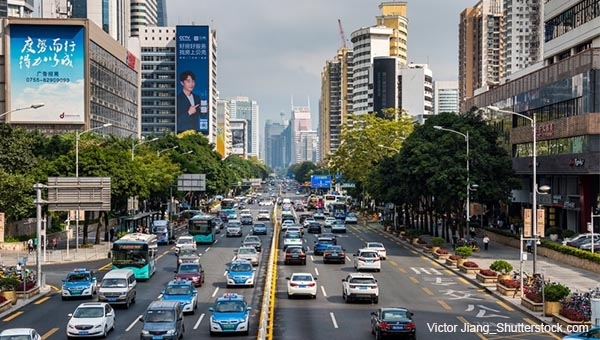Ms Fong said during the interview programme Hang Seng SCOM, arranged by the School of Communication of Hang Seng University, that easier entry for arrivals from outside Hong Kong would help restore normalcy and strengthen Hong Kong's competitiveness. The HKTDC would invite more foreign companies to come to Hong Kong to participate in forums and exhibitions.

Hong Kong Trade Development Council Executive Director Margaret Fong (middle) said the HKTDC would continue to lobby foreign companies to boost Hong Kong. She attended the Hang Seng interview with Professor Hung Tso (left) and Associate Dean Ronald Chiu of the Hang Seng University of Hong Kong
HKTDC plays bridge role
Ms Fong said overseas companies had doubts about the investment environment in Hong Kong, so the HKTDC needed to play a bridge role and actively lobby businesses and organisations to boost confidence. “Foreign businesses have relatively limited channels for receiving information from Hong Kong. Coupled with the Sino-US trade friction and the impact of the epidemic, we need to explain more to them and provide a lot of real data. For example, Hong Kong's foreign direct investment in 2021 ranked third in the world, reflecting the local market’s strength. There is still great potential for development. At the same time, we will invite them to come to Hong Kong to participate in the activities, so they can feel the vitality and opportunities of Hong Kong.”She hoped entry rules related to COVID would ease further and believed a return to normalcy would be beneficial and enhance Hong Kong's competitiveness, and pointed out that the HKTDC would invite more foreign businesses to participate in Hong Kong's forums and exhibitions.Hong Kong has formally applied to join the Regional Comprehensive Economic Partnership (RCEP) trade body which spans from Japan in the north to New Zealand and Australia in the south and includes all ASEAN nations. Ms Fong believed membership would help SMEs expand business opportunities.
“The latest World Economic Outlook report released by the International Monetary Fund mentioned that the Asian market had the greatest potential for development. Therefore, Hong Kong should make good use of its advantages as a financial centre and focus on developing new business opportunities in ASEAN in the short term."
Hong Kong brands leading in GBA
The Belt and Road Initiative and China's new dual-circulation economic policy would boost Hong Kong, Ms Fong believed. “The large-scale infrastructure construction in the early stage of the Belt and Road Initiative has been completed and the later development is mainly to open up markets and establish supply chains. SMEs in Hong Kong will be able to provide related services, such as financing, logistics, supply chain management, legal and tax advice.” She also pointed out that Hong Kong brands had a competitive advantage in the mainland. Hong Kong companies, including start-ups, would further explore the market in the Greater Bay Area and promote dual circulation.She hoped entry rules related to COVID would ease further and believed a return to normalcy would be beneficial and enhance Hong Kong's competitiveness, and pointed out that the HKTDC would invite more foreign businesses to participate in Hong Kong's forums and exhibitions.
Hong Kong has formally applied to join the Regional Comprehensive Economic Partnership (RCEP) trade body which spans from Japan in the north to New Zealand and Australia in the south and includes all ASEAN nations. Ms Fong believed membership would help SMEs expand business opportunities.
“The latest World Economic Outlook report released by the International Monetary Fund mentioned that the Asian market had the greatest potential for development. Therefore, Hong Kong should make good use of its advantages as a financial centre and focus on developing new business opportunities in ASEAN in the short term."The Belt and Road Initiative and China's new dual-circulation economic policy would boost Hong Kong, Ms Fong believed. “The large-scale infrastructure construction in the early stage of the Belt and Road Initiative has been completed and the later development is mainly to open up markets and establish supply chains. SMEs in Hong Kong will be able to provide related services, such as financing, logistics, supply chain management, legal and tax advice.” She also pointed out that Hong Kong brands had a competitive advantage in the mainland. Hong Kong companies, including start-ups, would further explore the market in the Greater Bay Area and promote dual circulation.
 Hong Kong brands have a competitive advantage in the mainland
Hong Kong brands have a competitive advantage in the mainland
Related linksFull recording
